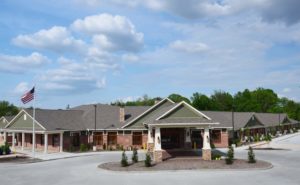
Access control is how a facility limits who can open the doors and gates on the premises. The goal of access controls is to allow the people who are welcome to enter and to keep out those who are not. If residents are coping with cognitive or memory issues, it may also be important to ensure that residents who are leaving the building are doing so safely. The best, most effective access controls are simple to use and flexible to change. This combination gives everyone the most peace of mind, the ease of getting where you need to go without hassle and the comfort of knowing that the facility is safe.
The traditional access control for buildings are keys. With the advances in technology, we’ve also seen facilities try using keypads, swipe cards, and fobs. The latest technology, such as Genea building access control, lets residents, staff, and visitors use their phones or tablets for entry into senior living facilities. Here are some considerations for how to think about good quality access controls for senior living centers.
Changes in Residents and Staff
People don’t stay in the same job forever. Staff turnover is inevitable in every workplace. It’s also natural for every place where people live to have changes in its residents. Good access security will be able to accommodate those changes without creating hassle and expense. Having to make and distribute new keys to staff or residents is expensive, time consuming, and can be a nightmare to manage. Digital keys, such as key cards or phone apps, allow you to give and access rescind to specific individuals as needed, without disrupting others keys and access.
Lost Keys and Forgotten Codes
Another truism is that humans make mistakes. You can be assured that residents, staff, and visitors will lose their physical keys at some point or that they will forget the code to the door. It’s true for any type of key that people have to physically keep track of, from traditional metal keys, to cards and fobs. This is so common that facility managers typically have a process ready to correct the problem. It’s much less of an issue for keys connected through a phone app. If a resident misplaces their phone or tablet, they can simply reload the app onto their replacement device, using instructions already available to them. Apps mean there is no need to remember codes.
Key Copying
Metal door keys can be copied. Even if the key is etched with the phrase “do not copy,” there are unscrupulous locksmiths who will still copy them. As such, just one disgruntled or scheming employee can undermine a facility’s whole security system if he or she makes copies of keys without the owner’s knowledge or permission.
Varieties of Levels of Access
Every residential building has spaces for both residential use as well as the mechanical functions of the building and grounds. In a facility where a large number of people live and work, it can be important for safety and security to limit which people have access to which parts of the place. Obviously, residents will want to be able to secure their own living spaces, limiting who has access to themselves, their guests, and the staff who are welcome to enter. This is also true for areas like those used to store supplies, commercial kitchens or laundries, mechanical areas such as where central air conditioners and hot water tanks are kept.
Residents probably need little to no access to the areas where only staff work. Staff access should always be limited to those areas where they actually work or take breaks. For example, the groundskeeper needs access to the storage sheds, staff break room, and perhaps the basement, but not to the kitchen or to residents’ private spaces. Managers and supervisors need master access keys that allow them entry anywhere and everywhere, in case of an emergency.
The old fashioned way to handle these access issues was to give people keys for the specific doors they needed to open. That led to huge key rings and a lot of confusion when trying to find the right key to a door seldom used. Electronic keys solve that problem more elegantly, since a card, fob, or app can be programmed with the right codes for entry to the exact spaces that are appropriate.
Time Limited Keys
One major advantage of digital keys, that many people may not realize, is that sometimes it’s just as important to limit when people have access to a space as who has access to that space. For example, if the facility hires an outside contractor, it is much safer to give them access between certain hours of the day via a phone app, than to give them keys that allow them to enter and exit any time. The same goes for visitors or people accessing an area for a special event.